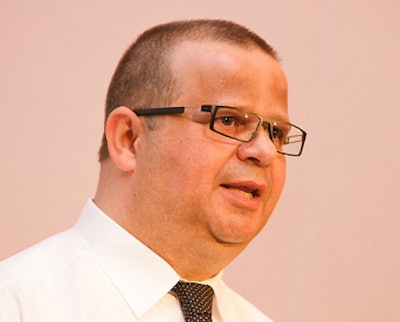
Professor David Hughes, Johann Morwald and Danielle Cagan were among the speakers at the recent International Egg Commission Business Conference Vienna 2014. They shared valuable knowledge and insights with IEC members about a variety of topics pertinent to the global egg industry and its relations with supermarkets and consumers.
What supermarkets want and what consumers expect
Hughes, IEC’s global food marketing analyst, led the newly styled Customer Focus session at IEC Business Conference. The new format included an informal interview between Hughes and each speaker at the end of their presentation, allowing Hughes to really drill down into the details that matter to egg businesses.
Morwald, former CEO and board member of ALDI, provided delegates with invaluable insight into the way discount retailers work, and how to maximize a company’s opportunity of becoming a supplier. He told delegates that within Central Europe, 80 percent of eggs are sold through grocery retail stores, and that the two leading discount stores account for 60 percent of this market share.
Hard discounters, such as ALDI and Lidl have grown their market shares during the recent years. Hughes told IEC delegates that research shows that in many countries consumer confidence is still fragile following the global recession. He referred to consumers as now being “savvy shoppers,” reducing their basket size in the big superstores, explaining that the middle market stores, such as Walmart’s Asda, Morrison and Tesco in the UK have been squeezed for market share. Hughes explained that it is the retailers at either end of the spectrum that are thriving in today’s market: premium retailers are doing well at one end and convenience stores, hard discounters and online retailers are thriving at the other end.
How to break into the supply chain
Morwald told the IEC that ALDI’s aim to offer the best retail price to customers is of course linked to them achieving the best purchasing prices. Morwald explained that ALDI has an accomplished system of providing “the lowest price, best quality, limited range of daily necessities.” He explained that this system offers great strategic benefits and achieves the highest profit margins per item of all market participants.
Floor space will go to the highest bidder
Morwald told the IEC: “Please accept that purchasing directors of supermarket chains act as administrators of a limited space which is to be awarded to the highest bidder.” Due to the scarcity of floor space the purchasing director must achieve the highest possible attainable profit for the lowest possible allocation of space. Morwald added: “It is therefore an important commandment of all negotiations to be well prepared, with sophisticated layouts and design concepts, to convince the purchasing director of additional value to sales and profit by eggs.”
He said that communication between the supplier and the end consumer is key, telling the IEC it is the responsibility of the supplier and producer to create excitement with the customer – not the retailer: “It is a requirement of the time to develop innovative sales and communication concepts to show convenience aspects for the modern society.”
He stressed the importance of being involved in decision-making processes and standard setting that impact on the industry, saying as well as promoting the benefits of eggs, it would also help to gain consumer trust.
Johann Morwald concluded his presentation to the IEC voicing his support for the egg industry, saying: “I want to encourage you to be proud of your work as producers and marketers of one the most important foods in the history of mankind.”
Transparency and traceability key to building consumer trust
Consumer trust and supply chain integrity were key elements of Cagan’s presentation to the IEC. Cagan, European lead buyer for Nestlé, spoke in detail about supply chain integrity and the importance of transparency and traceability in creating and maintaining consumer trust. She explained that, where possible, supply chains are now being shortened and strengthened, as part of the ongoing effort to provide greater traceability, and ultimately greater transparency to consumers. As customers’ expectations increase, manufacturers in turn expect more from their suppliers.
Cagan stressed to the IEC the need for her suppliers to demonstrate excellent control of their product supply, both in terms of production levels and price. She spoke about Nestlé supplier code, which rules all Nestlé business relationships with suppliers. The code focuses on business integrity, sustainability, labor standards, safety and health, environment and direct engagement with farmers. She also outlined the company’s expectations towards egg products in Europe, explaining the need to demonstrate financial robustness, production capabilities and technology levels, as well as having the necessary quality and safety measures in place.
Potential for growth
Nestlé is the world’s largest food processor and manufacturer. It employs 333,000 people worldwide, has 461 factories in 83 countries and a revenue of CHF93 billion (US$104.3 billion). Eggs, and egg products in particular, play a significant role in Nestlé’s product offering and Cagan still sees further room for growth in the egg category, referring to the potential to tailor product sizes to target specific markets, and introducing smaller pack sizes and individual products where appropriate.
Growth in e-commerce food industry
Hughes also predicts further growth in the food industry, although he was referring to the growth in the industry’s e-commerce markets. He explained that consumers are becoming ever more technologically savvy. Hughes used the growing Amazon Fresh as a prime example, explaining that Amazon is already predicted to be the No. 2 global retailer in the future now it has broken into the fresh food market.
IEC Global Leadership Conference Edinburgh 2014
The next International Egg Commission conference is being held in Edinburgh, Scotland, September 7-11. The IEC Global Leadership Conference Edinburgh 2014 will focus on the topics and events that can really make a difference to your business.
Industry experts and world class speakers will be leading the conversation, discussing egg production, marketing, egg processing and economics.














